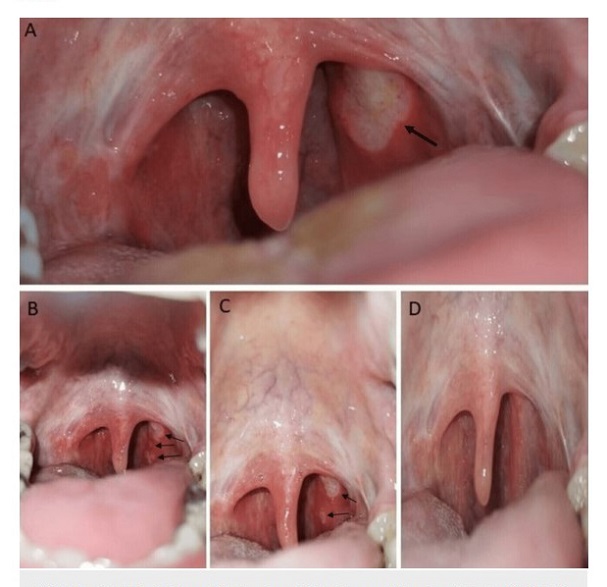Nikhil Prasad Fact checked by:Thailand Medical News Team Nov 04, 2024 5 months, 1 week, 6 days, 11 hours, 57 minutes ago
Medical News: COVID-19’s Impact on the Mouth
Since the emergence of COVID-19, scientists have noted a range of symptoms affecting various parts of the body. Among these, changes in the oral cavity have become increasingly apparent. This case study investigates a 35-year-old patient who experienced painful, aphthous-like lesions during two separate COVID-19 infections. The research provides insights into the possible connections between COVID-19 and recurring oral manifestations, suggesting a need for further exploration in this area.
 A: Aphthous-like lesions (black arrow) during the first COVID19 episode two years ago; B: Aphthous-like lesions on Day 2; C: Aphthous-like lesions on Day 7; D: Complete resolution of the aphthous-like lesions on Day 20
A Surprising Recurrence of Oral Lesions
A: Aphthous-like lesions (black arrow) during the first COVID19 episode two years ago; B: Aphthous-like lesions on Day 2; C: Aphthous-like lesions on Day 7; D: Complete resolution of the aphthous-like lesions on Day 20
A Surprising Recurrence of Oral Lesions
This
Medical News report focuses on the case of a male patient who, after two COVID-19 infections, developed recurring aphthous-like lesions in his mouth. These painful, ulcer-like spots first appeared on his oral mucosa two years ago during his initial bout with COVID-19. He noticed similar lesions during his recent second infection, pointing to a potential direct link between SARS-CoV-2 and these oral manifestations. His case adds weight to ongoing studies investigating how COVID-19 might impact the body beyond the respiratory system.
Details of the Case: Patient’s Symptoms and Diagnosis
The patient, who had previously been healthy with no chronic illnesses, presented with fever, malaise, a dry cough, throat pain, and difficulty swallowing. He tested positive for COVID-19 and noted the return of the aphthous-like lesions, which had first occurred during his initial infection two years prior. In both instances, the lesions emerged within the first few days of the infection, manifesting as red, ulcerated patches on the back of his throat, surrounded by a distinct halo. These lesions caused considerable discomfort and added to his symptoms of COVID-19.
During the recent diagnosis, his laboratory results showed a mild increase in C-reactive protein, indicating an inflammatory response. However, other tests to rule out common causes of aphthous ulcers, such as viral infections, autoimmune conditions, and vitamin deficiencies, returned negative results. This finding supports the idea that SARS-CoV-2 may be a direct factor in the development of these oral symptoms.
Treatment Plan and Recovery
The treatment for these oral lesions involved a 0.12% chlorhexidine mouthwash and a 0.1% triamcinolone acetonide mouthwash. The patient was also advised to take acetaminophen for fever and to isolate at home. The prescribed mouthwashes, used multiple times a day, helped reduce inflammation and prevent secondary infections, accelerating the healing process. His symptoms gradually improved, with the lesions beginning to regress by Day 7. After 20 days, the lesions had completely disappeared, marking the end of his second experience with COVID-related aphthous-like lesions.
Possible Mechanisms Behind COVID-Related Oral Lesions
r />
The study suggests a few theories on why COVID-19 may cause such oral symptoms. The virus’s spike protein binds to the ACE2 receptors, which are found in several tissues, including the oral cavity. This receptor interaction facilitates viral entry into cells, potentially leading to inflammation and tissue damage in the mouth. The immune response triggered by SARS-CoV-2 also plays a role. Increased levels of pro-inflammatory cytokines such as TNF-α and IL-1β are typical in COVID-19 infections and can disrupt the delicate balance of immune cells in the oral cavity.
Another proposed mechanism is the alteration of oral microbiota by SARS-CoV-2. This shift may contribute to the development of oral lesions, as the normal balance of bacteria in the mouth helps maintain oral health. Changes in this microbiome can leave the mucosa more susceptible to infection and inflammation, potentially leading to the formation of aphthous-like lesions.
Broader Implications: COVID-19’s Reach Beyond the Lungs
Though primarily a respiratory disease, COVID-19 has shown it can impact various body systems. The case study offers evidence that the virus can directly affect the oral cavity, suggesting that healthcare providers should consider oral symptoms as part of COVID-19’s clinical picture. Oral lesions, such as those experienced by this patient, may serve as early indicators of COVID-19 infection, highlighting the need for increased awareness among medical and dental professionals alike.
Study Limitations and Areas for Further Research
While this case provides valuable insights, it has limitations. Due to its nature as a single-patient case study, the findings cannot be generalized without additional research. Furthermore, the study lacked pathohistological analysis, which could have provided more in-depth insights into the tissue changes caused by COVID-19. More extensive studies with larger sample sizes and molecular testing are necessary to understand the exact relationship between COVID-19 and oral manifestations.
Conclusion: Insights for the Future
This case study highlights the possible role of SARS-CoV-2 in triggering oral lesions, emphasizing the need for more awareness and research. The fact that the patient experienced these lesions during both of his COVID-19 infections suggests that the virus may have a unique impact on the oral cavity. Recognizing oral symptoms as potential markers of COVID-19 could lead to earlier diagnoses and improve patient outcomes, especially in cases where respiratory symptoms are not prominent.
The study findings were published in the peer-reviewed journal: Cureus.
https://www.cureus.com/articles/301574-aphthous-like-lesions-in-a-patient-across-two-courses-of-covid-19-infection-a-case-report#!/
For the latest COVID-19 News, keep on logging to Thailand Medical News.
Read Also:
https://www.thailandmedical.news/news/individuals-with-long-covid-after-omicron-infection-show-altered-oral-microbiota
https://www.thailandmedical.news/news/covid-19-can-enhance-the-invasiveness-and-progression-of-oral-squamous-cell-cancer
